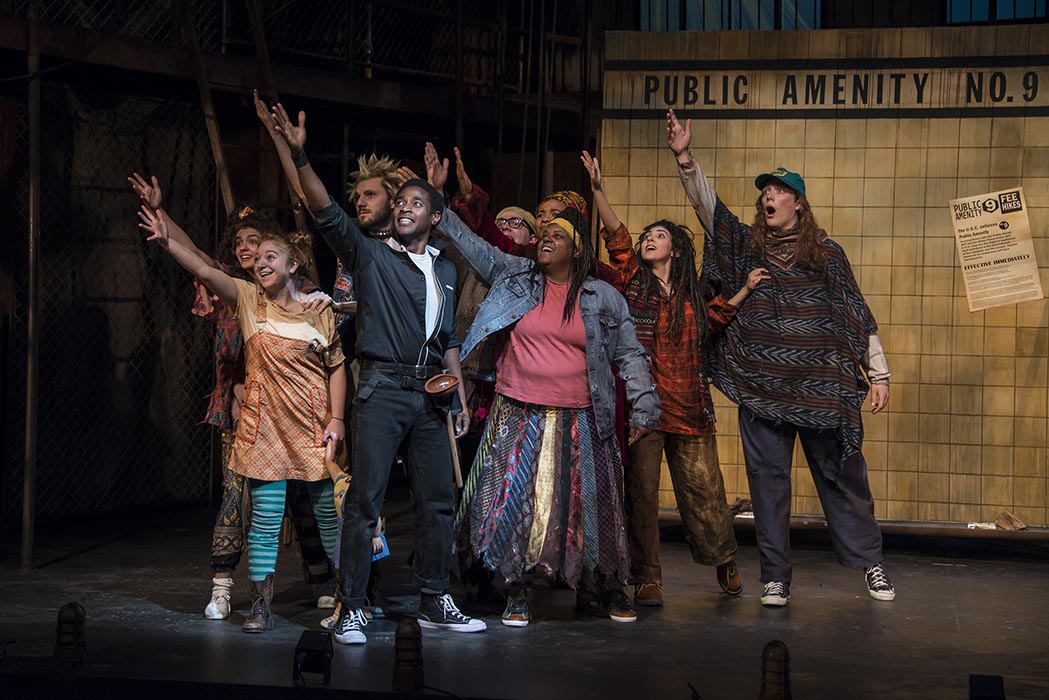One good rule of theatre: seize comic irony when it falls in your lap. As the audience arrived for the opening night of the Clarence Brown Theatre’s production of Urinetown, the Musical, they had to pass by the theatre’s new and still under-construction restroom facilities that sported a subtle signage tie-in to Urinetown over its unfinished doorways. Catching the visual reference, while not essential for enjoying this supremely entertaining and exhilarating production, certainly made the point that comic satire and parody were to be a goal of the evening.
As that audience soon learned, satire and parody were just the beginning of an energetic evening. Urinetown is set in a dystopian future where a long-term drought has forced the corrupt government, in league with an even more corrupt corporation, to outlaw private toilets, forcing the residents to use the facilities at “Public Amenity” stations for a fee. Those who cannot pay must hold it until they can; those that take to the alleys or bushes for relief are hauled off by police and sent to the mysterious “Urinetown,” the much-feared place from which no one ever returns.
Lest one think the premise a tad too bizarre, this musical that opened on Broadway in September of 2001 and won Tony Awards for Best Score and Best Book of a Musical, has a nodding precedent in the theatre of Bertolt Brecht from works like The Threepenny Opera. And, it serves as comic parody of Broadway musicals in general, particularly those that trade on excessive sentimentality like Les Miserables, Fiddler on the Roof, and even Chicago. And, somewhat surprising, the work also uses comic irony to satirize socio-political movements based on a misplaced populist social conscience—not that there is anything wrong with such a thing.
Mark Hollman’s music is addictive, its stylistic songs and rhythms possessing hints of Kurt Weill at times. The lyrics by Hollman and book writer Greg Kotis explode with pee-centric puns and double entendres (“You’re in Urinetown”), with everyday language taking regular hits as well for the sake of comedy.
Like many of CBT’s season-ending productions, no effort has been spared in making this one an overwhelming visual and aural feast, albeit one prepared in a grimy kitchen dripping with generous amounts of sarcasm. Director William Osetek has drawn his cast and artistic crew from a combination of CBT staff, MFA candidates, undergrad students, and imported professionals. Faculty designer Christopher Pickart has filled the CBT stage and auditorium with a deliciously gritty industrial environment in dirty colors, heavy with off-kilter catwalks and filled with shadowy soiled cloth in a suggestive yellowy color, definitely appropriate for an urban dystopia. Shadowy lighting, cut by follow spots, filled the gloom in muted colors courtesy of lighting designer Jordan Vera. Marianne Custer’s costumes were a triumph of street urchin chic and industrial textures contrasted with satirically fine garments for the corporate elite. Dirty windows were projection screens for designer Joe Payne; cleverly detailed sound effects and reinforcement were from Mike Ponder.
Hinting at a neo-Brechtian structure of communicating with the audience directly, the plot’s satiric quasi-narration comes from the character of Officer Lockstock (Norm Boucher) who symbolically controls the production from a steampunk-esque panel of heavy electrical throw-switches. He’s joined in the narration/exposition—including self-serving ridicule of musicals themselves—by the street orphan, Little Sally (Crystal-Marie Alberson). Alberson’s energetic physical comedy is one of the performance highlights of the production, illuminating a character loaded with depressing curiosity, Debby-Downer fatalism, and pesky street urchin reality.
Some of the action is set at “Public Amenity No. 9,” “one of the poorest, filthiest urinals in town,” run by Penelope Pennywise (Charlotte Munson) and her assistant, the young hero, Bobby Strong (Jade Arnold). Munson made her Pennywise a comedic and vocal masterpiece, especially with the number “It’s a Privilege To Pee.” Bobby Strong has his eye on Hope Cladwell (played with delicious naiveté by Brittany Marie Pirozzoli), not realizing she is the daughter of Caldwell B. Cladwell (Peter Kevoian), the head of the government-supported enterprise—Urine Good Company—that continues to profit from the need-to-pee of the poor citizenry. Kevoian, seen last December as Fezziwig in A Christmas Carol, wallows in some brilliant comic ruthlessness with his number “Don’t Be the Bunny”, symbolic advice given to Hope to “toughen up.”
Osetek and his choreographer, Christie Zimmerman, have given the production a real vibrant buzz and spark via the ensemble of secondary characters that weave rhythm and punctuation into the scenes of the put-upon citizenry. Of course, driving that rhythm and punctuation is the music score handled solidly by a five member ensemble under the crisp direction of CBT faculty member Terry Silver-Alford.
As part of the narration, Lockstock tells Little Sally that this is not a happy musical and eventually everyone loses. But, let’s be honest: that’s there for the Brecht-ophiles. The truth is this is a production of top-notch performances, driving energy, and satisfying sardonic wit. For those in the audience laughing way too hard—as some did on opening night—just remember: you’ll have to wait for intermission to use the public amenity.
Urinetown, the Musical continues at the Clarence Brown Theatre through May 6. Performance schedule.
Correction: In a previous version of this review, the character “Caldwell B. Cladwell” was incorrectly called “Coldwell B. Cladwell”.






